Heartworm Medicine Buying Guide
Your guide to choosing the best heartworm prevention medicine for pets.

- Pet Supplies
- Buyers Guide
- Heartworm Medicine Buying Guide
Why is heartworm prevention important?
Imagine your dog getting weaker every day, having difficulty breathing, losing its appetite, and eventually, its heart failing. These are just some of the things that could happen if your pet gets heartworm larvae through mosquito bites in their bloodstream.
Heartworm is fatal. Once your pet gets treatment, it can be painful and not to mention expensive. Prevention is seen as a way for a safer, less painful, and cheaper method. This is genuinely more compassionate when it comes to treating your pet, especially your dogs, who are the primary host of these worms.

Prevention is better than cure!
Prevention is always better than cure. According to the American Heartworm Society, we must advocate "Think 12". This means dogs will undergo monthly heartworm prevention for one whole year and will have annual testing. You don't want to wait for the symptoms to show before you start treating them. FDA stresses the importance of prevention. There are many FDA-approved heartworm medications you can buy. Consult with your vet which medicine is the most suitable for your pet.
Shop for heartworm controlWhat is heartworm?

Your pets getting heartworm is no walk in the park. Dubbed by veterinarians as the "silent killer", heartworm disease is a severe disease that causes lung disease, heart failure, organ damage, and in worse cases, even death to pets mainly to dogs, cats or ferrets. Heartworm is a worm known in science as "Dirofilaria immitis". These worms are known as heartworms because they live in the heart, lungs, and blood vessels of animals. Your pet can catch these worms through mosquitoes carrying microfilariae (baby worms) from another infected pet.
Heartworm disease
What are the heartworm symptoms in pets? There are three significant stages of heartworm disease in pets, and symptoms from these stages vary. These are early-stage, middle-stage, and late-stage.

Dogs
There are 5 warning signs or symptoms to watch out for heartworms in dogs.
Early-stage symptoms of heartworm disease
- Dry, persistent cough from small amounts of exercise caused by heartworm larvae moving into a dog's lungs.
- Lethargy or weakness as your pet loses interest in activities like walking or any physical activity that can be strenuous to them.
- Weight loss since even routine actions like eating snacks can be tiring to your dog, causing them to lose weight quickly.
Middle-stage symptoms of heartworm disease
- Difficulty breathing is the result once the heartworms mature, along with coughing and breathing problems similar to an asthma attack.
- Bulging ribs can be seen as fluids fill your pet's lungs or fluid buildup from parasites. These ribs will appear more bulge as a result of weight loss.
* Once these worms become fully grown adults, they may cause long term implications for your pets.
Late-stage symptoms of heartworm disease
In the later stage, you will notice heightened symptoms from the early-stage, such as lack of appetite, dry cough, and lethargy. More complications will then start to show. A pet is in the late-stage of heartworm disease when there are:
- Abnormal sounds within the dog's lungs
- An enlarged liver
- Heart murmur

Cats
Though cats can still get heartworms, symptoms may be different for cats as they are not the ideal host for these worms. Because of this, cats usually resolve or manage heartworms on their own but this does not mean cats are left undamaged. Heartworms in cats can cause respiratory damage and decline in their immune system. Some symptoms are:
- Coughing
- Wheezing
- Difficulty breathing
Heartworms may also migrate to other parts of the cat's body, such as the brain, eye, and spinal cord. Once a worm dies in the cat's body, there can be severe complications like blood clots in the lungs and lung inflammation.
Where is Heartworm most common?
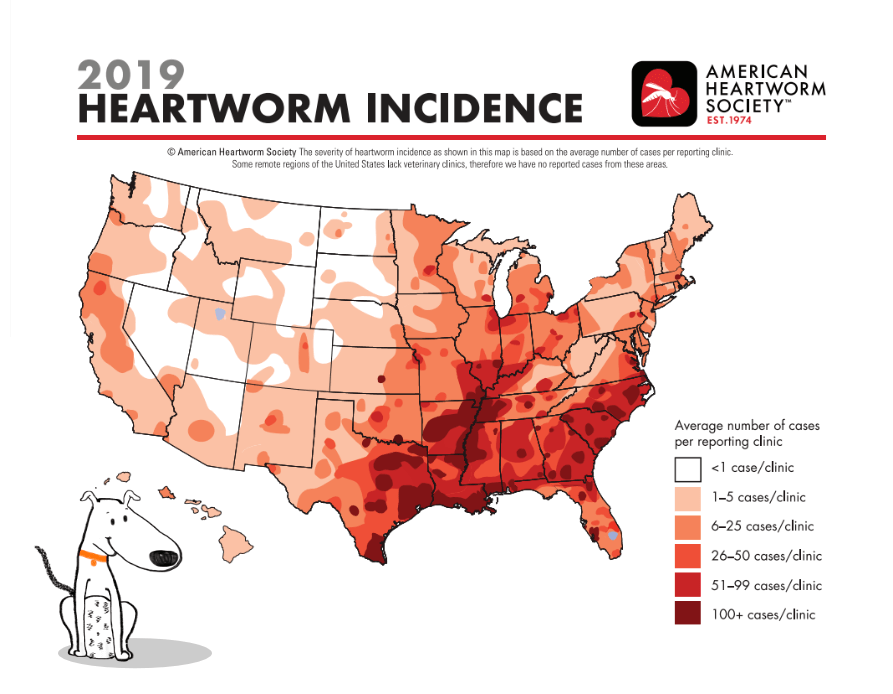
Reported cases of heartworm in pets from veterinary clinics continue to grow, especially to southern states and coastal regions. The American Heartworm Society (AHS) gathers heartworm data every three years from veterinary clinics and shelters nationwide to understand the impact heartworms have across the nation and specific regions and create a detailed map showing the common heartworm-positive cases per clinic.
How do pets get heartworms? (How it's transmitted)
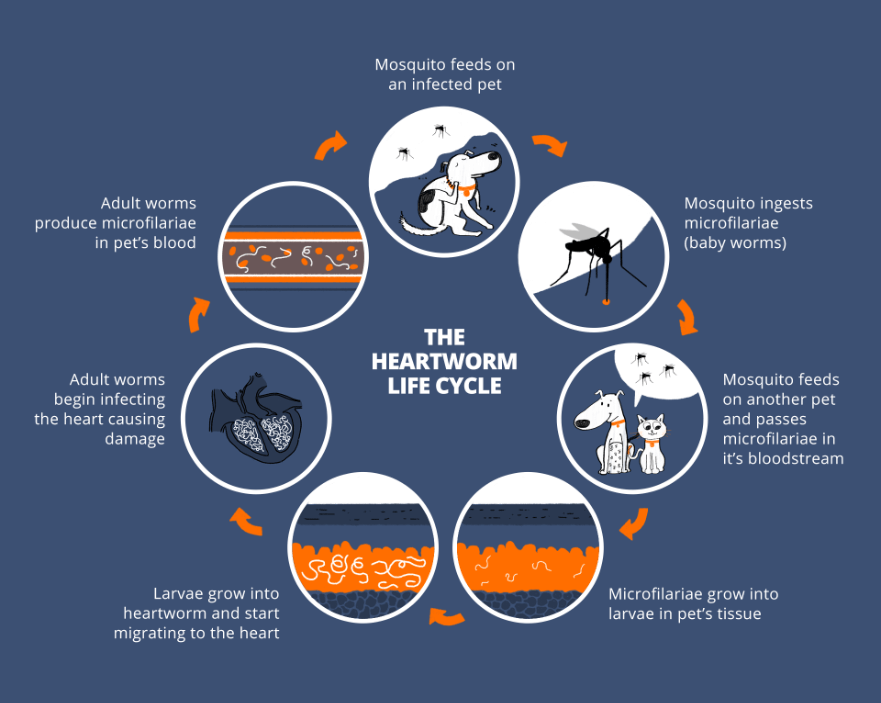
Mosquitoes play a significant role in passing the disease to your pets. Pets can only get heartworms through a mosquito bite, so heartworm disease is not contagious. Once these mosquitoes bite an innocent dog, they can pass on these baby heartworms in your pet's blood stream and will eventually grow into your pet's tissues as larvae. These larvae will ultimately migrate to your pet's heart and lungs, causing damage. Once a mosquito bites an infected pet and then bites another innocent pet, this cycle will continue. Start protecting your pet from heartworms to end this cycle and protect other pets as well. Get to know more tips to keep your pets and household away from heartworms carrying mosquitoes.
Can heartworms be transmitted to humans?
It is rare for humans to get heartworms once bitten by an infected mosquito. Also, since humans are not natural hosts of heartworms, heartworm larvae usually die in the artery before becoming adult worms.
Why is heartworm testing important?
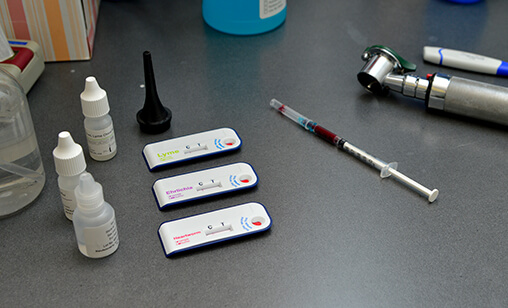
Can my dog take heartworm medicine without testing?
It is vital to make sure your pet doesn't have any heartworm infection before giving medication for heartworms. That is because when a dog is infected, there can be life-threatening effects to the dog once the circulating microfilariae (baby heartworms) start dying. Only infected dogs have microfilariae in their bodies. Also, additional testing is essential as your pet might have missed a dose, or the dog might have to spit it out or vomited it out, making them unprotected.
If a dog ever gets infected, treatment in the early stage is essential to avoid damage in their heart and lungs, causing severe or life-threatening illnesses. Testing is still part of prevention as we don't want the infection to become critical. Heartworm medications could only kill the early-stage larvae, and adult heartworms may continue to grow and produce microfilariae in your pet's body.
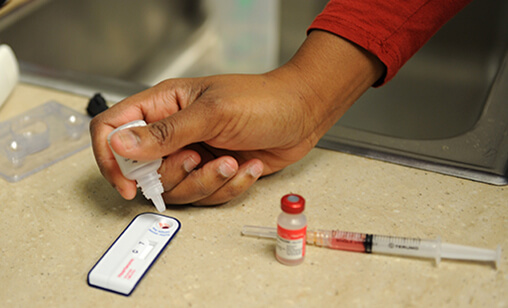
When should I test my pets for heartworms?
Dogs
Testing for heartworms should be done annually, especially for dogs. Puppies from 7 months can start a heartworm preventive then have another visit after six months for retesting. After that, you will continue to have heartworm annual testing. Puppies under seven months can start heartworm prevention before heartworm testing. We need to repeat it because it takes six months before a dog could have a positive test result for heartworm disease, so testing at seventh month is essential. Again, if it so happens that your dog missed a dose or unknowingly, your dog vomited or spitted out its heartworm medicine, your dog could lose its protection, so testing yearly is a must.
Cats
For cats, it is much harder to detect for heartworms unlike with dogs, and it's rare for cats to have adult heartworms. Tests for cats are different. Vets may have to screen cats using both an antigen and antibody test to detect exposures to heartworm larvae, as this is the preferred screening method for cats. Your vet may also have to use x-rays or ultrasound to see signs of heartworm infection. Just like dogs, cats need to be tested by vets before giving them heartworm prevention. The timing for retesting depends on your vet whenever they see fit. Also, note that unlike dogs, there is no approved treatment for heartworm disease in cats, so prevention is highly important.

Why get a heartworm test every year?
As previously explained, symptoms of heartworm disease get more severe and dangerous as the infection progresses. Therefore, the sooner it can be detected, the better chance your pet can recover and reduce the occurrence of long-term implications for your pet. Testing your pets for heartworms for your dog is as quick and easy as taking a few blood samples and then processing them right from the veterinary hospital or diagnostic laboratories. If ever your dog would test positive, your pet will have to undergo further tests.
Treating Heartworm Disease
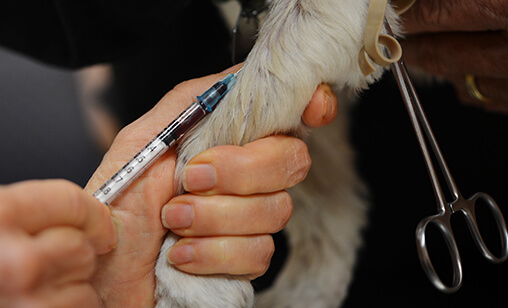
My pet is heartworm positive, what now?
Whilst heartworm infection is quite common for dogs, no one would be okay to learn that their beloved dog has a heartworm infection. But you'd be glad to hear that the majority of infected dogs have a successful treatment. The key is to stabilize the symptoms or signs of the disease and then kill off all stages of the worms in your pet's body while keeping at minimum the side effects of heartworm treatment.
Treatments for dogs with heartworm
Here are some of the things you could do or expect once your dog tests positive:
- Confirm diagnosis. Once proven positive, there will be further tests as treatment is both complicated and expensive. Your vet must make sure that treatment is indeed necessary.
- Restrict Exercise. It is especially crucial for active dogs because physical activity can increase the damage heartworms can cause to your pet's heart or lungs. Therefore, the more symptoms appear, the less movement your dog should have.
- Stabilize the disease. Before treatment, your dog must undergo appropriate therapy to stabilize your dog's condition, which can take several months in severe cases.
- Administer treatment. Once deemed stable and ready for treatment, the vet will have to take several steps in treating your pet. Your vet shall recommend a treatment protocol through a guideline recommended by the American Heartworm Society. Pets with mild symptoms (cough, exercise intolerance) have a high success rate with treatment. Successful treatment is still possible for pets with more severe cases, but there are higher chances of complications. Note that severity of heartworm infection does not always correlate to the severity of symptoms your dog may have, dogs with severe heartworm infection may have zero to only a few signs in the early stages of the disease.
- Test for success. Once completed, after six months, your vet will have to perform another heartworm test to determine if heartworms are truly gone. For your pet to avoid getting heartworm infection again, your pet must be protected with heartworm prevention throughout the year and then tested yearly for heartworms.
Treatments for cats with heartworm
Compared to dogs, cats can have fewer heartworms in their body ranging from one to six worms only whereas a dog can have an average of 15 worms in their body. Unlike for dogs where the severity of the disease correlates to the number of infections, for cats, even just 1 or 2 heartworms could cause severe problems. The following are what you can expect if your cat tests positive for heartworm:
- Diagnosis. A cat's diagnosis can be complicated as it requires not only several kinds of blood tests but the physical exam and x-ray, and sometimes ultrasounds may be included.
- Treatment. Sadly, there is no approved treatment for heartworms in cats and treatments administered to dogs are not safe to use for cats. Despite this, proper veterinary care could still help your cat. The important thing is to stabilize your cat and have a long-term management plan.
- Monitor your cat. A cat can be cleared of heartworm infection, but may still have been left with permanent damage. If a cat is not showing signs of respiratory problems, but worms are present on the lungs, your vet may recommend a regular chest x-ray. If symptoms persist, a vet may recommend prednisolone to reduce inflammation.
- Veterinary care. Severe diseases may need additional support. Some pets may need to be hospitalized after therapy to provide necessary drugs and treat symptoms and, of course, provide general nursing care. In some cases, vets may recommend surgical removal of heartworms.
- Continuous prevention. As your cat has developed heartworm disease, this would mean that your cat can be at risk of heartworm infection, whether your cat stays indoors or outdoors. Maintaining the use of monthly heartworm prevention can keep your cats from being infected again.
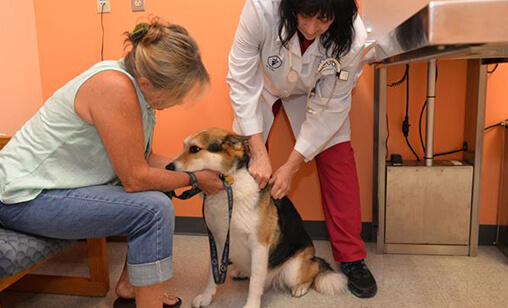
How do heartworm treatments for dogs infected with heartworms work?
There are many kinds of treatments your pets will take for heartworms depending on the developments of the heartworm infection. Some of these treatments are as follows:
- Adult worms. If your dog has adult worms, your vet will have to conduct a series of injections for your dog with melarsomine to kill heartworms in your heart and vessels near it. The schedule of injection differs depending on the condition of your dog.
- Bacteria. A lot of dogs have to take an antibiotic called doxycycline to fight against Wolbachia, a bacteria that lives inside the heartworm.
- Microfilariae. The vets will also have to kill the microfilariae or heartworm larvae. Your vet may recommend doing this treatment before or after treating your dog against adult heartworms. Once done, the doctor will have to let your dog stay in the hospital for observation and for administering medications.
Although treatment is possible, it can still be dangerous as these worms reside in the heart. Unlike intestinal worms where dead worms will just have to pass as feces, heartworms are very different. Once they get killed, they will have to move in the lungs, where they will be slowly absorbed in the body. Prevention is still the best treatment. Not only is it a lot cheaper than cure, but it is also absolutely safer and more successful if appropriately administered (not missing a dose).

Is treating existing heartworms painful?
Treating existing heartworms can potentially be toxic to your dog's body, causing severe complications such as blood clots in their lungs, which is life-threatening to your dogs. Aside from that, treatment can be expensive as it requires multiple vet visits, blood tests, x-rays, hospitalization, and series of injections.

Why is heartworm treatment expensive?
A lot of factors contribute to the cost of heartworm treatment. One of the factors is the drug of choice, immiticide. This drug is hard to obtain due to manufacturing issues, making it expensive. Not only that, it is also a protocol for vets to be very involved in treating pets with heartworms, and the procedure can take several months. Other factors include:
- Diagnostic testing
- Hospitalization
- Medications
- Vet visits
How does heartworm prevention work?
Surprisingly, heartworm preventives do not stop heartworms from entering your pet's body. What it does is prevent the infection from occurring by removing the larval infection or killing these larvae before they grow up into adults, killing them in certain stages of their development. You have to take note though that heartworm meds can only kill larvae and will not be able to kill adult worms.
When should heartworm prevention begin?
Whatever the age of your pets, whether it be puppies or kittens, they all have an equal risk of getting heartworms. According to the American Heartworm Society, you can get your pet on a heartworm preventive as early as the product label allows but not later than eight weeks. The medication is based on body weight and not on the age so ask your vet for the right dosage for your pet as puppies and kittens can gain weight rapidly.
Why is heartworm preventive important?
Even if your state does not pose a high threat against heartworms, due to unforeseeable changes in the temperature or seasons, vets still recommend year-round prevention in every state. As pets get to travel more with their owners, the presence of heartworms across the US is becoming more prevalent. That is why whether your pet stays indoors or not, you should always make it a habit to "Think 12." Give heartworm prevention twelve times a year and test every twelve months.
How do I choose Heartworm medicine?

There are three types of heartworm medications to choose from. They could be oral, topical, or injectable. More popular products are either an oral tablet. One option is to have your pet injected every six or 12 months. Only a veterinarian can do this procedure.
Types of heartworm medicine
There are a lot of FDA-approved medications in the market. Some are even effective against other parasites like intestinal worms, flea, ticks, and mites. Below are some of the medicines you can give your pet every month.
Topical Heartworm Prevention
This type of preventive medicine is a fluid applied on your pet's skin at the back of their neck which their skin will absorb into their body. Some of these topical medicines are:
Advantage Multi
(Imidacloprid & Moxidectin)
- Heartworms
- Fleas
- Mange Mites
- Hookworms
- Whipworms
- Roundworms
Pets seven weeks or older and 3 pounds or heavier.
Revolution
(Selamectin)
- Heartworms
- Fleas
- Sarcoptic mange mites
- Ear mites
- American ticks
- Intestinal parasites
(free Canex for dogs) Pets over six weeks of age.

Oral Heartworm Prevention
Oral heartworm preventives are a blessing to pet owners as these are often in a chewable form that tastes like treats for pets.
Heartgard Plus for Dogs
(Ivermectin & Pyrantel)
Most popular heartworm preventive in the market:
- Heartworms
- Roundworms
- Hookworms
Dogs of any weight who are over six weeks of age.
Sentinel
(Milbemycin oxime & Lufenuron)
- Flea eggs
- Hookworms
- Roundworms
- Whipworms
- Heartworms
Dogs 4 weeks and older and more than 2 pounds of body weight.
Sentinel Spectrum
(Milbemycin oxime, Lufenuron, & Praziquantel)
- Heartworms
- Flea eggs
- Roundworms
- Hookworms
- Whipworms
- Tapeworms
Dogs over two weeks of age and re-administer at 4, 8, and 12 weeks of age before continuing on the regular monthly dosing schedule.
NexGard Spectra
(Afoxolaner and Milbemycin Oxime)
- Heartworms
- Adult fleas
- Ticks (Deer, American, Lonestar, Brown)
- Roundworms
- Hookworms
- Whipworms
Dogs over eight weeks of age and 2kg or more.

Overdose Concerns With Heartworm Pills
As heartworm chewables mostly taste like treats, these pills should be kept away from pets and avoid them from taking more of this. Overdosage of these pills may lead to vomiting, tremors, lack of coordination, shock, and even death.
How often should I give heartworm prevention?
Heartworm prevention must be given to pets once a month. As heartworm preventives only kill larvae, once you miss a dose, if an infected mosquito transmits microfilariae to your pet, these worms might mature and cannot be treated by heartworm preventives alone.
What heartworm medicine is best for my pet?
Recommended heartworm medicine for dogs
Recommended heartworm medicine for cats
Choosing the best heartworm preventive
Here is a comparison chart of heartworm preventives to help you decide which med is best for your pet.
| Fleas |
Ticks |
Heartworm |
Intestinal Worms |
||||||||||
| Product |
Usage | Adult Fleas |
Flea Eggs |
Flea Larvae |
Deer Tick |
American Tick |
Lone Star Tick |
Brown Tick |
Heartworm |
Round-worms |
Hook-worms |
Whip-worms |
Tape-worms |
| Revolution | Spot On | Cats |
Cats |
||||||||||
| Revolution + Canex | Spot On | Dogs |
Dogs |
||||||||||
| Stronghold | Spot On | Cats |
Cats |
||||||||||
| Advantage Multi | Spot On | ||||||||||||
| NexGard Spectra | Chew | ||||||||||||
| Heartgard Plus | Chew | ||||||||||||
| Generic Revolution for Cats | Spot On | ||||||||||||
| Generic Heartgard Plus | Tablet | ||||||||||||
| Generic Sentinel | Tablet | ||||||||||||
Check out our ultimate comparison chart for all your pet's parasite control (flea, tick, worm, and heartworm).
Check comparison chartHeartworm Testimonials at Pet Shed
NexGard Spectra
Great stuff!
May 10, 2019
I'm in the US and it is nice to have a product that covers BOTH heartworm prevention and fleas and ticks in one chewable tablet. Combining them makes it cost effective, easy to administer and the dogs don't get suspicious lol. We recommend Nexgard Spectra to all our friends.
Stronghold for Cats & Dogs
Great Product
Mar 05, 2019
I've been using this product for years on both my dog and cat (he's indoor/outdoor) with no side effects. Very good at flea control. Decent with the ticks too, although the pets can still carry them in the house and I'll find ticks (3 or 4 per year) crawling up the curtains and walls in late July and August. I think that is just because we haven't had severe winters the last 3 years and the insects survive better. I like that it covers worms and lice too. I am so thankful that I can buy it here at Pet Shed for the best price available! Highly recommended!
Revolution for Cats & Dogs
Best flea medicine I have found
Oct 10, 2018
Have tried quite a few flea medications on my dogs. This one works the best. It is easy to apply, no smell, no staining. My dogs are outside half the day, and I never see a flea on them at all.
Advantage Multi (Advocate)
fantastic
Mar 13, 2018
i use stronghold, revolution or advocate depending on which i can get the best deal on. I have 4 cats and 4 dogs...these are the best products i have ever used... no issues for the animals and oh so easy to administer!
NexGard Spectra
bug treat
Jun 23, 2018
I have been using this on my dogs for awhile now an I really like the results ,some things make dogs kind of sick an so far I haven't seen this ,also they don't always eat what I give them but this they chew it up I don't have to make them swallow it!
Revolution for Cats & Dogs
My Vet Recommended Revolution
Jan 22, 2018
A few years back our cat started acted strangely. She didn't seem steady on her feet and was sluggish. When we took her to the vet he told us she was having an allergic reaction to FLEAS! I had been using Frontline for some time (can't remember for sure but think it had been several years). He said he had switched to selling Revolution in his office and went on to explain why. Pretty much repeated whats written here in the description. I purchased only one application because it was VERY, VERY expensive in his office. As soon as I came home I placed an order here which always saves us quite a bit of money. Our cat has been fine ever since.
Preventer Plus (Milbemycin oxime & Lufenuron)
It works!
Nov 13, 2017
This product works! ya'll must give it a try, you'll save a lot and you'll definitely get your babies protected from harm. You're like hitting two birds in one stone! Perfect!
Heartgard Plus Chewables
Absolute Savings
Apr 19, 2017
We may be new to Pet Shed but the first time we ordered this product back in 2016 gave us a new favorite Pet Store. Aside from their customer service who are very accommodating and lovely. Pet Shed made us realized that we can keep our pets from harm without spending a whole lot of money. Pet Shed is not just doing business but they're helping customer and our pets at the same time. We love you all!
Preventer Plus (Milbemycin oxime & Lufenuron)
Never seen a flea on my outside dogs!
Aug 17, 2017
I have two labs that stay outside. With this pill I have had only 1 tick in 6 months and have never seen a flea on my girls! Very much worth it!
Heartgard Plus Chewables
Why pay more?
May 05, 2016
I tried "generic" before and ended up with hard pills my dog would spit out. If this is generic Heartguard, neither my dog nor I can tell! Soft chewables that actually seem bigger and softer than actual Heartguard. The shipping takes a little longer but well worth it for the great prices.
FAQs
-
Is heartworm medicine really necessary?
Even if your state does not pose a high threat against heartworms, due to unforeseeable changes in the temperature or seasons, year-round prevention is recommended in every state. As pets get to travel more with their owners, the presence of heartworms across the US is becoming more prevalent.
-
What is the best heartworm medicine for dogs?
There are several factors in choosing the best heartworm medication for your pet. Some medications fight more than just heartworms but fleas, ticks, and intestinal worms as well. Some of our best selling heartworm control are Heartgard Plus, Revolution, Sentinel Spectrum, and Advantage Multi.
-
Do dogs need heartworm medicine in winter?
In many parts of America, mosquitoes are active all year. So keeping your pets under protection is highly important. To some states where winter can be frigid remember that several factors can still infect your pats against heartworms:
- Travel. Many would like to escape the harsh winter weather and travel to warmer areas along with their pets. Traveling while forgetting to give your pet heartworm medicine would leave your pet unprotected.
- Combination meds. Most preventives do more than just heartworm control. Some may protect against fleas, ticks, lice, mange, and intestinal worms. So not only are your pets susceptible to heartworm disease but to all these other parasites that may be included as well.
- How it works. It's important to know that this doesn't prevent heartworms from getting into your pet. It instead kills the larvae of the parasite transmitted into your pet from the previous month. Not giving the last dose at the right time only leaves your pet open to heartworm infection.
-
Can my dog take heartworm medicine without testing?
It's important to know that this doesn't prevent heartworms from getting into your pet. It instead kills the larvae of the parasite transmitted into your pet from the previous month. Not giving the last dose at the right time only leaves your pet open to heartworm infection.
Pet Care Essentials
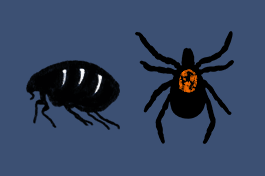
Flea and Tick Control
Fleas and ticks are common pet parasites known to be disease carriers. They are not just irritating but also harmful to your pets. Keep your pets safe and comfortable with flea and tick medications.
Shop for Flea and Tick Control
Heartworm Control
Heartworms are dangerous roundworms transmitted by mosquitoes as a larva that matures into your pet's major organs, posing a significant threat to their health. Prevent your pet from the dangers of heartworms with heartworm control.
Shop for Heartworm Control
Wormers
Worms are parasites that commonly affect cats and dogs. There are lots of ways your pets can get infected if untreated. Regular dosing of worm control can help prevent the spread of parasites for your pets, family, or environment.
Shop for Wormers




